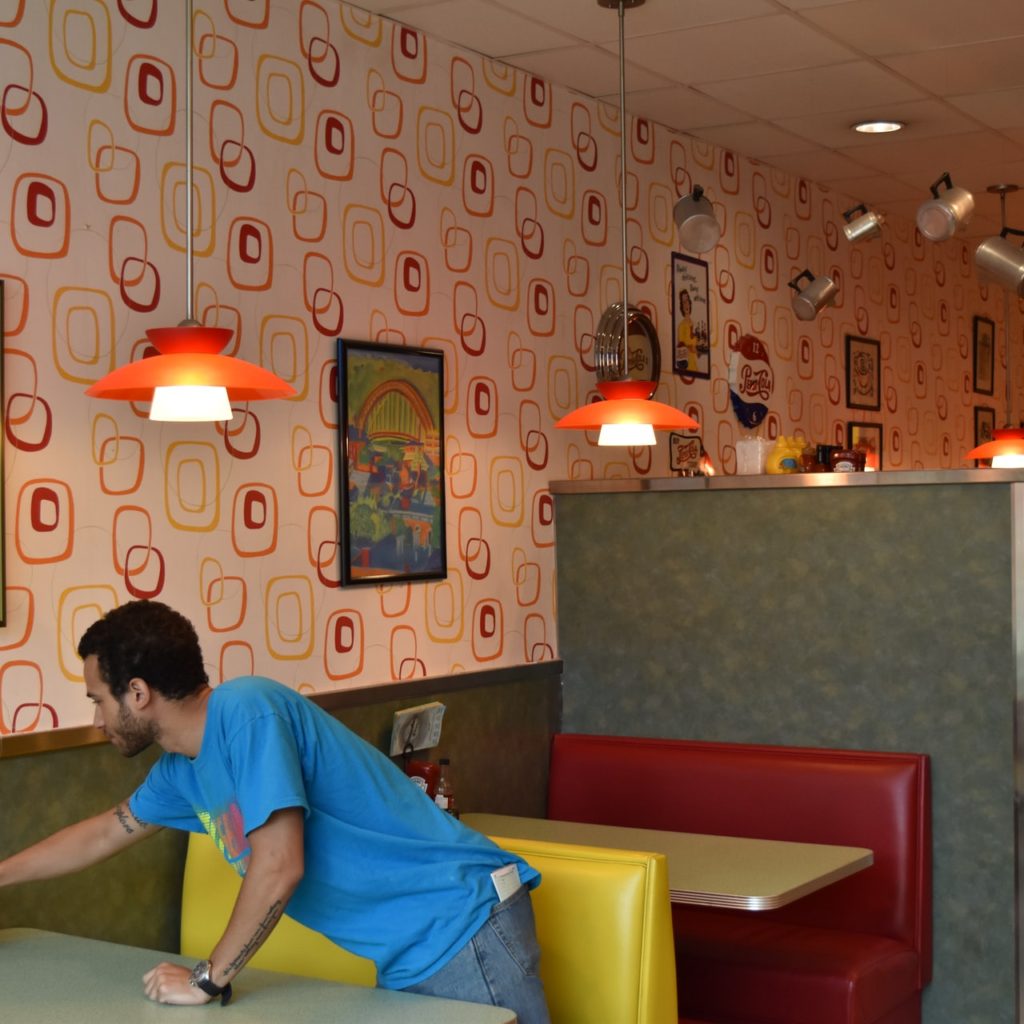This is a guest post written by Tara Christle.
When Ellen Stumbo shared her post, Why Our Kids With Disabilities Deserve Better ‘Life Skills’ From School, I asked her if she would mind if I wrote a response that addressed some of the systemic gaps that I often see missed during these discussions in parent spaces.

I worked in food service for fifteen years. And I have several disabilities.
I’ve heard the indignation from parents of disabled children, insisting “My child can do more!” “My child will never perform a menial job!” And while their heart is likely in the right place, I know that most of them just don’t understand the perfect storm of oppression and forced choice that leads many disabled adults down this exact path.
My Story:
I had early exposure to this type of work, through a single Take A Child To Work Day when I was twelve. It was enough to give me a very general sense of what was required. I could visualize the space and types of tasks, however I had no idea if I would be able to replicate any of the tasks I was observing. (A cultural difference – perhaps due to neurodivergence – means that disabled people often will not know how – or if – they will be able to perform a task without first being allowed to explore it experimentally. Verbal explanations of physical tasks only take some of us so far.)
I didn’t start my life with a burning desire to work in food service. (At age seven, however, I did memorably draw a picture indicating that when I grew up, I wanted to work at McDonald’s. But I think that had more to do with the allure of being able to eat all the French fries I wanted and make money too.)
The expectation was to graduate high school, go to college, graduate college, then get A Job. I started close to home at a local community college, intending to complete my generals and save money before heading to a university.
Going to college without reliable transportation was a major obstacle. While I sometimes relied on family to drive me the seven miles to school, more often I used an accessible transportation service. This service required riders to be certified through a two-part application and meet eligibility guidelines. Riders then had to call the service four days in advance – in the wee hours of the morning – to ensure that a ride was booked, as space was limited. Riders then paid an affordable flat rate for a local ride. However, this transportation service regularly ran two hours behind. Most college classes are 50 to 80 minutes long. It wasn’t uncommon to miss one to one and a half classes a week, sometimes more.
I worked up to 20 hours a week at a small drugstore within walking distance of my house for two years after high school. When I transferred to a university an hour from home to live on-campus, I went on a leave of absence, intending to continue working during school breaks. This was during the early 2000s. Unemployment was high. The accessible on-campus university jobs filled up immediately. And thanks to the recession, when I returned home for the summer, the drugstore wasn’t able to hire me back.
I was paying for school with my own savings as well as some savings bonds bequeathed by a relative, but university tuition is nowhere near as affordable as community college. I was soon broke, depressed and in debt. Completing school was no longer an option. I managed to pay off my school debt by working odd jobs for about a year before being hired to work in food service.
Within a year-and-a-half, I was living in accessible housing roughly 1.5 miles from my job – across a major highway. I’d stopped using accessible transportation, knowing I’d be fired for not showing up on time within a week if I relied on it. So if I didn’t have a ride, a morning shift meant crossing a major highway in the dark at 5:45 a.m. (If the weather was inclement, I’d pay for a cab. Spendy on a food service salary.) My disabilities meant I fell frequently. Sometimes on sidewalks. Sometimes in the street. Once, I was nearly hit by a speeding car on the highway as I hurried to finish crossing one pre-dawn morning. Another time, a car drove off the road and onto the sidewalk right in front of me.
Food service work was nothing short of grueling. Daily tasks included ingredient preparation, food preparation (including dough preparation which is a multi-step process over many hours), washing, drying and putting away dishes, cleaning equipment, auditing food items for freshness at regular intervals, cleaning the dining area, ordering and putting away all manner of supplies, regular temperature checks on hot foods, refrigerators and freezers as well as taking customer orders and running a cash register, among other responsibilities. Some days, I worked full shifts alone, trying to juggle everything simultaneously. And if I couldn’t find a ride? I would then walk a mile-and-a-half home.
The Pros About Food Service Work:
There’s an unspoken belief that no one wants a long-term career in food service. It’s seen as something to settle for. However, these types of jobs have attractive qualities for some people with disabilities:
No college degree needed for entry-level jobs.
No long commute.
A set schedule.
Hands-on and sequential daily tasks that go the same way each time.
A relatively small area of control.
Plus, food preparation is a life skill that is regularly taught on some level during school. Because of this, we tend to have a food preparation mental map outlining basic things like handwashing and sequential assembly of a food item at the very least. Knowledge of even these basics can set us up for more success than we might experience at a completely unfamiliar job. Food preparation skills are also helpful in independent or interdependent living situations.
How Ableism Contributes:
Ableism – or the discrimination of disabled people – has become more widely recognized in recent years. It exists in many forms.
Lateral ableism occurs between disabled people. Internalized ableism occurs when a disabled person holds discriminatory beliefs about themselves.
If I say something or someone is ableist, I could be referring to an interpersonal exchange between myself and a nondisabled individual. However, I could also be referring to The Way Things Are – buildings that are inaccessible, ableist policies, and the unwillingness to change these things. This is what is known as systemic ableism.
Food service workers (and the menial job force in general) are looked down upon by society, despite the fact that they provide a service that most everyone will use at some point in their lives. This lack of respect can become more glaring when disability becomes a factor. It is legal to pay disabled workers less than minimum wage. The application system for most jobs is inherently ableist and meant to weed out potentially disabled employees (needing a vehicle, the requirement to be able to lift 20 pounds to name a few), contributing to an extremely high unemployment rate for disabled individuals.
Ableist concepts such as laziness and intelligence inform the treatment of disabled people. Those who can prove their intelligence while being highly productive members of society with admirable jobs are widely regarded as deserving of respect. Those who cannot prove their intelligence, who cannot produce at a fast pace, those who work menial positions are not deemed respectable. So, the standard of acceptable human behavior is implicitly lowered – resulting in workplace abuse from co-workers as well as customers. Low socioeconomic status often co-exists with disability, race and ethnicity, among other factors. This can also erroneously translate into an assumption of personal failings, laziness or ignorance, without taking into account the systemic barriers in place.
Disabled people are perceived (consciously or unconsciously) as valuable and worthy in nondisabled society only if we are sources of inspiration for nondisabled people. We “achieve” this by Overcoming Our Disabilities. By being out in public, by being in a good mood, or by working or performing everyday tasks, or by needing or accepting the help or Good Deed of a nondisabled person or business. Hiring a disabled person can be viewed as a Good Deed rather than a legitimate, smart hire. The business may be lauded, while the disabled employee is a magnet for both pity and abuse. We’re on display. We either “try so hard” or “work too slowly.” In America, our productivity defines our worth. Being less productive at work means costing a company money. It means being viewed as less valuable employees who are more deserving of aforementioned abuse. Disabled employees face daily microaggressions and ableism from all directions – all while simply trying to make a living wage.
Before judging a disabled individual or their support system for pointing them toward a low-paying service job, consider the attractive qualities of such jobs. Remember that ableism plays a multi-faceted role in not only the narrowing of opportunities, but affecting how disabled individuals are treated if they are hired.
You can follow Tara Christle on Twitter.
***
Let’s connect on Facebook
Special Needs Parents, Are You Surviving?
I created a guide with 13 practical ways to help you find peace in the midst of chaos, opt in to make sure you get a copy of this freebie!



The parallels of what you describe to the structural racism described by Isabel Wilkerson ought to be noted. I have a BA, MDiv, and MA (almost a Ph.D.) and run into these ableist assumptions all the time. Job placement “experts” routinely shuffled me into these placements. And sometimes the church was the worst, refusing to consider my abilities. And I am not the only one
I have several disabled friends who face this too. Highly qualified but nobody will hire them because of ignorant assumptions on disability (ableism). As for the church and religious settings…yup, sadly, I am not surprised because I see this happen again and again.
As a white woman, I felt I lacked the nuance required to delve into the parallels of structural racism to structural ableism. I do know that Black and brown disabled people experience both racism and ableism – they are not parallel experiences, but something experienced simultaneously.
I’m sorry to hear that you too have had ableist assumptions thrust upon you.
Thank you for your comment!
Thank you for sharing your experience and helping me to understand so I can be a better support to people in my community.
Thank you for reading and commenting.
So great to see the other side of the argument from an actual disabled person. Thanks so much!
Thanks for reading and commenting!
I have cerebral palsy as well. I recently wrote about my struggles trying to find a job as well.
https://gracedowwrites.com/2021/07/07/finding-a-job-with-cerebral-palsy-proves-challenging/